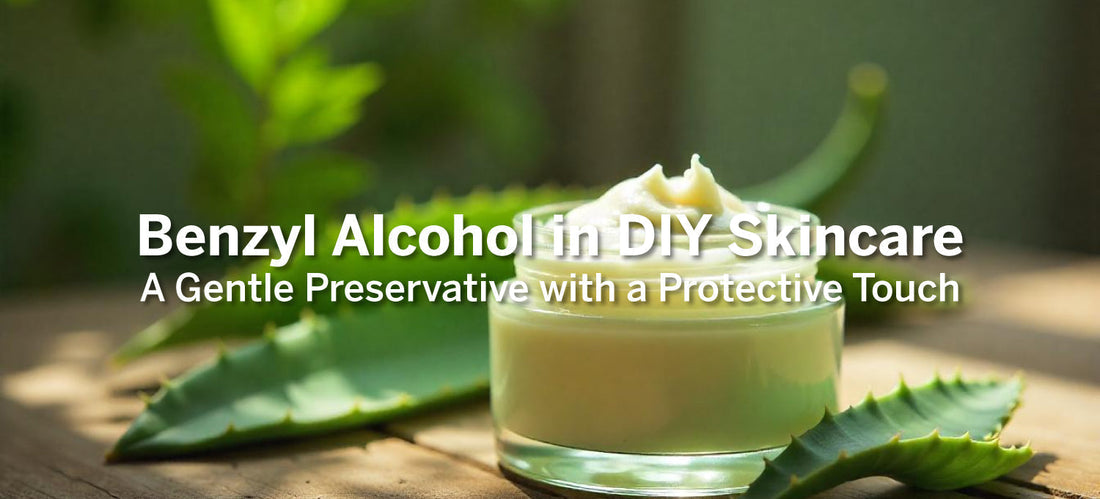
Benzyl Alcohol in DIY Skincare: A Gentle Preservative with a Protective Touch
Share
Benzyl Alcohol in DIY Skincare: A Gentle Preservative with a Protective Touch
When you hear “alcohol” in a skincare ingredient list, your mind might jump to harsh, drying types like isopropyl or ethanol. But not all alcohols are created equal. One often misunderstood yet incredibly useful ingredient is benzyl alcohol—a compound that protects your formulations and your skin.
What Is Benzyl Alcohol?
Benzyl alcohol is an aromatic alcohol found naturally in many fruits and teas, and it's commonly used in both commercial and DIY skincare as a preservative and solvent. Unlike isopropyl or ethyl alcohol, it’s non-drying and non-irritating at recommended levels—making it ideal for delicate skin.
Why It’s Used in Skincare (and Especially DIY Formulations)

In DIY skincare, preserving your product is not just a preference—it’s a necessity. Without a preservative, water-based products (like lotions and creams) are a breeding ground for bacteria, mold, and yeast. Benzyl alcohol:
- Offers broad-spectrum preservation when used in combination with other ingredients (like potassium sorbate or salicylic acid).
- Is accepted by natural and organic certification bodies.
- Has low toxicity and is suitable for leave-on products.
- Does not dry out skin like traditional “rubbing” alcohols.
How It Differs from Common “Bad” Alcohols
Let’s clear the air:
| Alcohol Type | Use | Skin Impact |
|---|---|---|
| Ethanol / Isopropyl | Antiseptic, solvent | Can be drying |
| SD Alcohol 40 | Astringent in toners | Often irritating |
| Benzyl Alcohol | Preservative, solvent | Skin-friendly |
Benzyl alcohol is chemically and functionally different. While other alcohols evaporate quickly and strip moisture, benzyl alcohol supports product stability without compromising skin health.
🧴 DIY Vitamin C Face Cream (with Benzyl Alcohol)

Now that we’ve established what benzyl alcohol is and isn’t, let’s put it to work in a nourishing DIY face cream! This recipe features antioxidant-rich ascorbic acid (Vitamin C), hydrating glycerine, soothing aloe vera gel, and emollient-rich shea butter—all protected by benzyl alcohol for a longer shelf life.
🌿 Ingredients (Makes ~100g)
Water Phase:
- 60g distilled water
- 1g ascorbic acid (Vitamin C)
- 3g vegetable glycerin
- 2g aloe vera gel
Oil Phase:
- 10g shea butter
- 5g sweet almond oil (or oil of choice)
- 3g stearic acid (for thickening and emulsifying)
Cool Down Phase (add when mixture is under 104°F/40°C):
- 1g benzyl alcohol
- 0.5g citric acid (to help maintain pH and support preservation)
- Optional: 1–2 drops essential oil (like lavender or frankincense)
🧪 Instructions
1. Prep:
- Sanitize all equipment and containers.
- Dissolve ascorbic acid in distilled water. Stir in glycerin and aloe vera gel (this is your water phase).
2. Heat:
- In a separate container, combine shea butter, oil, and stearic acid (oil phase).
- Heat both phases to ~160°F (70°C) using a double boiler.
3. Emulsify:
- Slowly pour the oil phase into the water phase while blending with an immersion blender or mini whisk.
- Mix for 2–3 minutes until a creamy consistency forms.
4. Cool Down:
- Let the cream cool below 104°F (40°C).
- Add benzyl alcohol, citric acid, and essential oil (if using). Stir well.
5. Store:
- Transfer to a clean jar or pump bottle.
- Shelf life: ~3 months, thanks to proper preservation.
✅ Why These Ingredients Work Together
- Ascorbic Acid (Vitamin C) – Brightens and supports collagen production.
- Benzyl Alcohol – Keeps your cream safe from microbial growth without irritation.
- Shea Butter – Deep moisturization with skin barrier benefits.
- Vegetable Glycerine – Attracts moisture and hydrates.
- Aloe Vera Gel – Calms redness and irritation.
- Citric Acid – Helps maintain pH and boosts preservation.
The Bottom Line

Benzyl alcohol deserves more love in the DIY skincare world. It quietly does its job—preserving your formulations, extending shelf life, and doing it all without the sting of its harsher cousins.
So the next time you read “benzyl alcohol” on a label, don’t panic—embrace it as the ingredient that pampers your product and your skin.
